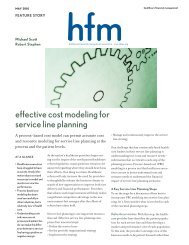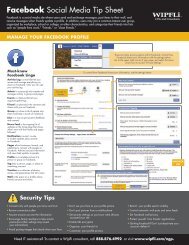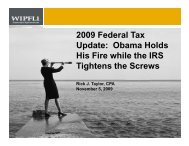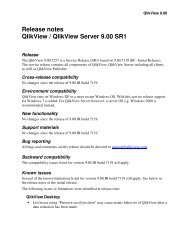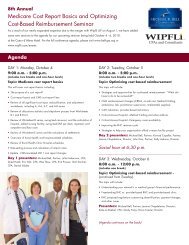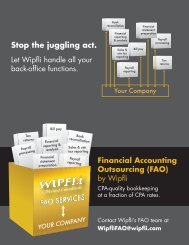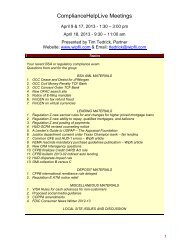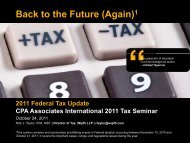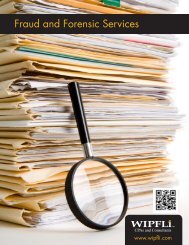Download PDF - Wipfli
Download PDF - Wipfli
Download PDF - Wipfli
Create successful ePaper yourself
Turn your PDF publications into a flip-book with our unique Google optimized e-Paper software.
USA Update continued<br />
Employers apply for the program by filing Form 8952,<br />
Application for Voluntary Classification Settlement Program.<br />
This form must be filed at least 60 days before the taxpayer<br />
wants to begin treating the workers as employees.<br />
Observation: The IRS has indicated that an employer which<br />
wants to begin treating a class or classes of workers as<br />
employees for the fourth quarter of 2011 may do so, but<br />
should file the Form 8952 as soon as possible.<br />
Additional VCP Consequences and Limitations<br />
In addition to filing Form 8952, employers which participate<br />
must sign a closing agreement with the IRS extending the<br />
statute of limitations from three years to six years for the<br />
first three calendar years beginning after the agreement is<br />
signed. The agreement also requires the taxpayer to treat<br />
the same class of workers as employees in the future.<br />
It should be noted that this Program only applies to<br />
employment taxes and does not address the impact of the<br />
reclassification of workers on the employer’s retirement<br />
plans and welfare plans (medical, dental, life, etc.). At this<br />
time, there does not appear to be any special relief for<br />
retirement and other benefit plans, so employers need to<br />
review the impact of any filing under the Program on the<br />
benefit plans they offer. Specifically for retirement plans,<br />
corrective contributions on behalf of misclassified workers<br />
and retesting of the plan’s coverage (required by regulation)<br />
for the years that workers were misclassified may be<br />
required. Insured benefits also should be discussed with<br />
an insurance agent.<br />
Observation for foreign investors: For a foreign business<br />
which has classified US individuals conducting US activities<br />
(perhaps incorrectly) as independent contractors, reclassifying<br />
them as employees may create a substantial risk of the<br />
foreign business being engaged in a US trade or business<br />
or having a permanent establishment in the US for US<br />
income tax purposes, resulting in increased US taxation.<br />
For more information please contact:<br />
Brent Lipschultz<br />
EisnerAmper LLP<br />
T: +1 212 949 8700<br />
E: brent.lipschultz@eisneramper.com<br />
W: www.eisneramper.com<br />
The problems of US LLCs for<br />
non-US investors<br />
United States Limited Liability Companies (LLCs) are treated<br />
as transparent for US tax purposes unless an election is<br />
made to treat them as corporations. They have generally<br />
become the preferred way for US individuals to operate<br />
business or make investments. Almost all countries (other<br />
than the US) treat LLCs as corporations. While the US has<br />
entered some tax treaties that deal with LLCs, many issues<br />
remain on the foreign tax treatment of LLCs and their<br />
members and there have been several recent cases in the<br />
United Kingdom and Canada when non-residents of the<br />
US invested in US LLCs.<br />
As a general rule it is not beneficial for non-US individuals to<br />
hold interest in US LLCs because, if the LLC is treated as a<br />
corporation in their jurisdiction, they cannot obtain a credit<br />
for US taxes incurred by the non-US members.<br />
In many jurisdictions corporations which own interest in US<br />
LLCs do not have a problem with LLCs but in some such<br />
as Canada, US LLCs present problems. However, as a<br />
general rule, Section 894 denies tax treaty benefits to<br />
certain types of income received by an LLC and distributed<br />
to a foreign corporation.<br />
George Anson v HMRC<br />
A recent UK tax case, George Anson v. HMRC, involves the<br />
tax treatment of income remitted to the UK from a member<br />
of a Delaware LLC. The issue was whether the UK member<br />
of the LLC should be taxed on partnership profits or dividends<br />
in the UK.<br />
An LLC formed in the US state of Delaware is taxed<br />
transparently in the US so that its profits are taxed as the<br />
income of its members. In the UK, these LLCs are treated<br />
as companies by HMRC.<br />
The Upper Tribunal’s decision to support the appeal by<br />
HMRC of the First-tier Tribunal's decision in this case is a<br />
victory for HMRC and restores the traditional understanding<br />
(which had arguably been called into question by the First-tier<br />
Tribunal's decision) that a Delaware LLC should be regarded<br />
as opaque for UK tax purposes.<br />
Although UK individual investors would generally prefer an<br />
51 // PKF International Tax Alert All Regions<br />
Issue 8 November 2011




